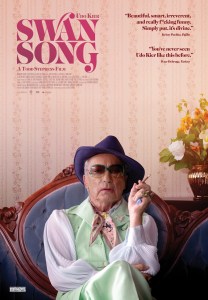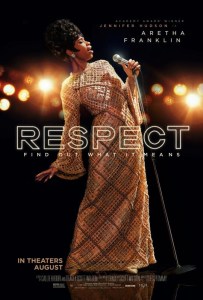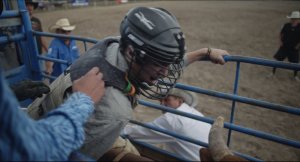Films reviewed: Swan Song, Beyond Monet, Respect
Hi, this is Daniel Garber at the Movies for culturalmining.com and CIUT 89.5 FM.
With the end of lockdowns finally reaching Toronto, people are itching to catch up on what they’ve been missing — from getting their hair cut, going to an art gallery, or listening to a concert on the big screen. This week I’m looking at two movies and one experience. There’s soul in Detroit, hairdressing in Ohio, and French impressionism in downtown Toronto.
Wri/Dir: Todd Stephens
Pat Pitsenbarger (Udo Kier) was once known as the Liberace of Sandusky Ohio, known for his gaudy jewelry, his pastel pantsuits and his flamboyant style. The richest women in town flocked to his hair salon where he could accomplish miracles with just his fingertips and a can of hairspray. But now he’s long-forgotten, a penniless old man living in a nursing home with puke-green walls and fluorescent lights. What happened?
His protege Dee Dee (Jennifer Coolidge) opened up a larger salon across the street from his, poaching his longest clients, including Rita Sloan a millionaire and his oldest patron. Then his lover David died of AIDS. And since this was before same-sex marriage, their shared house was inherited by a distant relative, leaving him homeless. So for Pat, Sandusky is just history. Until a lawyer named Mr Shamrock arrives at his room with a new development. Rita has died, and in her will she insists Pat be the one to style her hair in her coffin. And if he does he’ll inherit  25,000 clams. So Pat sets out on a long journey back to long-lost Sandusky, encountering strange people and places along the way. Will he get there in time for Rita’s swan song? And can he finish the job without any beauty supplies?
25,000 clams. So Pat sets out on a long journey back to long-lost Sandusky, encountering strange people and places along the way. Will he get there in time for Rita’s swan song? And can he finish the job without any beauty supplies?
Swan Song is a very gentle, low-key, and slow- moving homage to the gradually fading world of small town gay life in America. Though nostalgic, it doesn’t present a white-washed version. It features Pat (loosely based on a real person) as an inveterate shoplifter, Eunice his best friend who is known for loitering in public toilets, as well as the seedy gay bar where they used to lip-synch torch songs. Udo Kier, the great German actor, has fun with his role, injecting his own trademark campiness. Swan Song is a cute and gentle, (though too slow-moving) LGBT comedy.
Claude Monet was a fin-de-siècle French painter who daubed his canvases with bright spring colours. Critics at the time referred to his work derisively as impressionism, thus providing a name for the movement. But as his fame grew, his eyesight faded, and by the end his works veered to the nearly abstract. Today, though, his paintings of fields, gardens, water and most of all waterlilies are among the most famous of that era. Beyond Monet is an exhibition, not of his art, but rather an immersive experience. His works are projected on a circular, 360 degree wall and ceiling, about the size of a football stadium. The works themselves are constantly rising, falling, or gradually turning around inside the exhibition space, so you can see all of it without moving from your area. It’s constructed around a large wooden cupola in the centre, along with shiny, round landing pads spread all around to sit on. The images are softly animated: waves in his paintings rise and fall; in his winter scenes, snow seems to blow against the landscapes, while flowers and lillies bloom before your eyes. And a constantly-shifting — and at times quite lovely — original soundtrack of music and sound effects (like birds, crickets or waves) adds to the mood.
The exhibition is in three parts. The first consists 0f a few curved wooden bridges and some gossamer sheets hanging from the tall ceilings. It also has a series of bilingual signs explain the art. You pass through a hallway festooned with cheap mylar strips, into the main room where the actual show takes place.
Is seeing an original canvas by Monet the same as a projection, however well-rendered and animated, in a large space? No… not even close. This isn’t art, it’s about art. It reminds me of those parks with miniature versions of the Eiffel tower and the Taj Mahal.
What it is, though, is a pleasantly relaxing experience for those who want to appreciate Monet without the trouble of seeing his actual stuff. Interestingly, the entrance features an assortment of empty wooden canvas frames, to remind us, I suppose, that the real art is still on museum walls. But with the pandemic on, perhaps Beyond Monet is a way to get the feeling of his work without travelling far. And the show is well- ventilated, well-spaced and with a limited number of guests at any one time.
Dir: Liesl Tommy
It’s 1952. 10-year-old Aretha Franklin, known as “Ree”, lives in a middle class Detroit neighbourhood. Her father (Forest Whitaker) is a firebrand baptist preacher with a huge congregation. He is a colleague of the Rev Dr Martin Luther King, who Ree calls Uncle Martin. He holds Saturday night get-togethers where little Ree is the featured performer in a musical household. Still a child, she has the voice of a full-grown woman, and performs be-bop and scat singing, not just gospel. Her father intends to make her a star. By the late 50s he gets Aretha (Jennifer Hudson) signed with John Hammond at Columbia Records where she records old jazz standards with a full orchestra. But without any hits.
Then everything changes in the late 60s when she is taken under the wing of producer Jerry Wexler at Atlantic, the man who coined the term Rhythm and Blues. He introduces her to the back-up players at Muscle Shoals, men who know how to feel the music. Aretha brings in her sisters as back up singers, and  the rest is history. She becomes the queen of soul and her songs internationally famous.
the rest is history. She becomes the queen of soul and her songs internationally famous.
This music biopic follows her career over a 20 year period, from 1952 to 1972. And it’s not a smooth and steady ride. It’s called Respect partly because of her hit single but also to point out the lack of it she experiences from both her domineering father and her tempestuous relationship with the often violent and manipulative Ted (Marlon Wayans) her sometime husband and manager. It also exposes the harsh underbelly of her stable, middle-class life. She is raped at an early age (this is implied not shown) and gives birth to a number of sons while still in her teens (her grandma takes care of them.) Her father says she has “demons” inside, but maybe it’s just her trying to break free, whether through her music or alcoholism, from the relentless disrespect and physical and mental abuse she suffers for much of her young life.
 Respect is part performance, part melodrama, alternating between a near constant flow of music interspersed with re-enactments with her family, business, and love life. We see her ups and downs (mainly her downs), along with many — maybe too many — fights, tantrums and meltdowns. Biopics have two choices: either hire great actors with mediocre or dubbed voices, or great singers. Hudson is the latter. She has a fantastic voice, featured here in so many genres — gospel, jazz, soul and pop — which holds the movie together. The melodramatic scenes are a mixed bag, some very moving, others cringe-worthy. Whitaker is really good as CL Frankin, and Hudson is in nearly every scene. While Respect is not a great movie, I greatly enjoyed watching it.
Respect is part performance, part melodrama, alternating between a near constant flow of music interspersed with re-enactments with her family, business, and love life. We see her ups and downs (mainly her downs), along with many — maybe too many — fights, tantrums and meltdowns. Biopics have two choices: either hire great actors with mediocre or dubbed voices, or great singers. Hudson is the latter. She has a fantastic voice, featured here in so many genres — gospel, jazz, soul and pop — which holds the movie together. The melodramatic scenes are a mixed bag, some very moving, others cringe-worthy. Whitaker is really good as CL Frankin, and Hudson is in nearly every scene. While Respect is not a great movie, I greatly enjoyed watching it.
Look for Swan Song on VOD and digital formats. Respect opens theatrically in Toronto this weekend — check your local listings. And Beyond Monet is exclusively showing at the Metro Toronto Convention Centre now.
This is Daniel Garber at the Movies, each Saturday morning, on CIUT 89.5 FM and on my website, culturalmining.com
Daniel Garber talks with Cynthia Banks about The Caregivers Club
 Hi, this is Daniel Garber at the Movies for culturalmining.com and CIUT 89.5 FM.
Hi, this is Daniel Garber at the Movies for culturalmining.com and CIUT 89.5 FM.
A malady is sweeping the nation, an illness with no effective medication, no clear cause and no known cure. It starts out mild but its effects get worse and worse, ultimately leading to death. More than half a million Canadians suffer from it. What is this plague? HIV? Opioid addiction? Bird flu? No, I’m talking about dementia caused by Alzheimers. And patients with dementia need constant care.
The Caregivers Club is a new documentary that looks at three  patients with early-onset dementia and the very different decisions made by the people who care for them. It follows a mother who lives in her own home with caregivers hired by her adult daughter; a wife assisted by her husband; and a man who lives in a nursing home as his wife raises their three young kids. The film was written and directed by noted Toronto documentarian Cynthia Banks.
patients with early-onset dementia and the very different decisions made by the people who care for them. It follows a mother who lives in her own home with caregivers hired by her adult daughter; a wife assisted by her husband; and a man who lives in a nursing home as his wife raises their three young kids. The film was written and directed by noted Toronto documentarian Cynthia Banks.
I spoke to Cynthia by telephone from CIUT.
The Caregivers Club is playing on CBC Docs-POV at 9:00 pm on Sunday, and streaming online beginning today.
Sexy Strong Seniors! Movies Reviewed: Cloudburst, Still Mine
Hi, this is Daniel Garber at the Movies for culturalmining.com and CIUT 89.5 FM, looking at high-brow and low-brow movies, indie, cult, foreign, festival, documentary, genre and mainstream films, helping you see movies with good taste, movies that taste good, and how to tell the difference.
An ever increasing proportion of our population is made up of seniors, so it makes sense that more movies are made about them. They share certain themes: wisdom, loss, history and memory, dissatisfaction with change, along with infirmity, dementia or death. But, so far, not many are about old men and women as fully sexual, dynamic and heroic figures (exceptions include Haneke’s Amour and Sarah Polley’s Away from Her). So this week I’m looking at two new movies that do just that. They’re both told from the point of view of older couples fighting the system. As an added bonus, they both are set in scenic Atlantic Canada. One has a pair of older women escaping to Canada so they can get married; the other has a farmer and his wife fighting the system to build a house on their own land.
Dir: Thom Fitzgerald
Stella and Dottie (Olympia Dukakis and Brenda Fricker) are lovers. They’ve been together for decades, in small-town Maine. They know each other inside and out and like playing things like “hide the vibrator’ in bed. Stella has a foul mouth, a mannish haircut and a cowboy hat. Dottie is blind, plump, ailing, and motherly, with billowy dresses and curly white hair. Life’s a peach.
But when Stella isn’t looking, Dottie’s uptight granddaughter gets her to sign away her power of attorney. Then, with the help of her husband, the town policeman, she trucks her grandma away to an old-age home and takes possession of her house. Naturally, when Stella find’s out she’s furious. But there’s nothing she can do, since she’s not Dollie’s blood relative, just her lover. What to do? Stella has a plan…
She reconnoiters the old-age home, loads Dottie into her car, and heads off north to the Canadian border. If they can get up there they can get married and everything will be OK again. On the way, they see a hitchhiker, a young, modern dancer named Prentice (Ryan Doucette) showing some skin by the side of the road. Stella invites him on board but sets him straight “Pull up your pants kid — you’re humping the wrong fire hydrant!” He’s their third wheel, but adds a new flavour to the mix, as he tells them about his own home troubles. He also lets them have some private time when they’re caught in a cloudburst. Will they make it to Canada? Are they fugitives from the law? And can they pull off the wedding in time?
border. If they can get up there they can get married and everything will be OK again. On the way, they see a hitchhiker, a young, modern dancer named Prentice (Ryan Doucette) showing some skin by the side of the road. Stella invites him on board but sets him straight “Pull up your pants kid — you’re humping the wrong fire hydrant!” He’s their third wheel, but adds a new flavour to the mix, as he tells them about his own home troubles. He also lets them have some private time when they’re caught in a cloudburst. Will they make it to Canada? Are they fugitives from the law? And can they pull off the wedding in time?
This is light, comical road movie, full of jokes and radio music. All three of the leads are fun to watch as they play out their characters. It takes place in an Atlantic Canada that’s an idyllic, rustic place, full of tolerant, friendly folks. It’s not meant to be a serious story, more of a light comic fantasy. Funny and tender in some parts, sad in others, but never too deep. I think it’s director’s Thom Fitzgerald’s try at a mainstream crowd-pleaser– as opposed to his earlier, more experimental films, like Hanging Garden — and it works.
Dir: Michael McGowan
Craig and Irene (James Cromwell and Genevieve Bujold) live on a sprawling, 2000 acre family farm near St Martins, N.B. They’ve been married 60 years and have seven kids, and raise chickens, cows and strawberries. And they still live at home. They are very much in love, and still sleep together. Craig is tall, stern and gaunt; Irene has flowing long white hair that she lets loose on her slim body. (The movie makes a point at showing them bioth partially naked)
Irene’s memory is going, and she’s increasingly hard to handle in their old home. But Craig’s a stubborn old cuss, and there’s no way he’s leaving that place, despite their childrens’ entreaties.
So he decides to build a new house. By himself. By hand. He’s been schooled in the art of building since he was a lad, and St Martins was an old ship-building port, so he’s inherited all the rules: cutting and aging wood, building joists, making it all just right. He’s building a perfect, one story home, as tight as a ship, overlooking the Bay of Fundy. One where Irene will  never have to worry about climbing or falling down staircases again.
never have to worry about climbing or falling down staircases again.
But things start to go wrong. He never bought a refrigerated truck to transport his strawberry harvest – a new rule. So he can’t sell them. His cattle have wandered away since he didn’t fix a hole in a fence. And worst of all, Mr Daigle, at the licensing desk, says he didn’t follow the proper rules in building the new house, and posts WORK STOP notices all over the skeleton of the house he’s building. If he disobeys the law he could go to jail. Will the house be torn to the ground? Or will Craig and Irene win and get to live in their lovely new house?
Based on a true story – stubborn NB. farmer fights the bureaucrats — this is a nice movie with excellent performances by Bujold and Cromwell (He just won the best actor prize in a Canadian film this past weekend.) Some of the scenes looked similar to ones in Away from Her, with pretty Irene wandering unchecked, in a daze, with her long white hair blowing in her face.It’s modeled on rural life, and they both seem like real farmers, but it also shares the very slow, largely uneventful feel (I’m guessing here) of rural life. So it’s a bit sloooow, not so exciting. But it is a nice, gentle satisfying film to watch.
Cloudburst starts today, check your local listings, and keep your eyes out for Still Home which opens a few months from now, in May.
This is Daniel Garber at the Movies, each Friday morning on CIUT 89.5 FM and on my website, culturalmining.com .



 You can tell a lot about a culture by looking at how it treats its most vulnerable members. This week I’m looking at two dramas, one from the US, another from the U.K. There’s a teenaged bootlegger in a pickup truck in a badlands state; and an old lady in a van in Camden in a bad state of mind.
You can tell a lot about a culture by looking at how it treats its most vulnerable members. This week I’m looking at two dramas, one from the US, another from the U.K. There’s a teenaged bootlegger in a pickup truck in a badlands state; and an old lady in a van in Camden in a bad state of mind. She’s depressed. And there’s an older brother in prison.
She’s depressed. And there’s an older brother in prison. He meets with an older woman who brings in the bottles and he distributes them for cash. But he faces trouble and potential violence from rivals who think he’s poaching on their territory.
He meets with an older woman who brings in the bottles and he distributes them for cash. But he faces trouble and potential violence from rivals who think he’s poaching on their territory. who followed the rodeo circuit. They all share Carl’s last name, along with lots of others at the reserve, but Johnny and Jashawn barely knew him. So they are jealous of his “real” family. Will knowing his relatives help him get a job? Or will he move to the big city and leave his mom and sister behind?
who followed the rodeo circuit. They all share Carl’s last name, along with lots of others at the reserve, but Johnny and Jashawn barely knew him. So they are jealous of his “real” family. Will knowing his relatives help him get a job? Or will he move to the big city and leave his mom and sister behind? The Lady in the Van
The Lady in the Van 15 years.
15 years. Ironically, the more time he spends trying to learn about Miss Sheppard, the less he spends with the other old woman in his life – his own mother. She is neither glamorous nor mysterious not frightening, and he can’t bring himself to visit her. He’d rather think about the woman in the van in his driveway.
Ironically, the more time he spends trying to learn about Miss Sheppard, the less he spends with the other old woman in his life – his own mother. She is neither glamorous nor mysterious not frightening, and he can’t bring himself to visit her. He’d rather think about the woman in the van in his driveway. well. Alan Bennett’s books and memoirs often have internal dialogue that doesn’t work in plays or on the big screen.
well. Alan Bennett’s books and memoirs often have internal dialogue that doesn’t work in plays or on the big screen. The Lady in the Van opens today in Toronto, check your local listings; and Songs my Brother Taught Me is showing next weekend at Toronto’s Next Wave festival. Next Wave shows films by, for and about young adults, including many free screenings. Go to
The Lady in the Van opens today in Toronto, check your local listings; and Songs my Brother Taught Me is showing next weekend at Toronto’s Next Wave festival. Next Wave shows films by, for and about young adults, including many free screenings. Go to

leave a comment